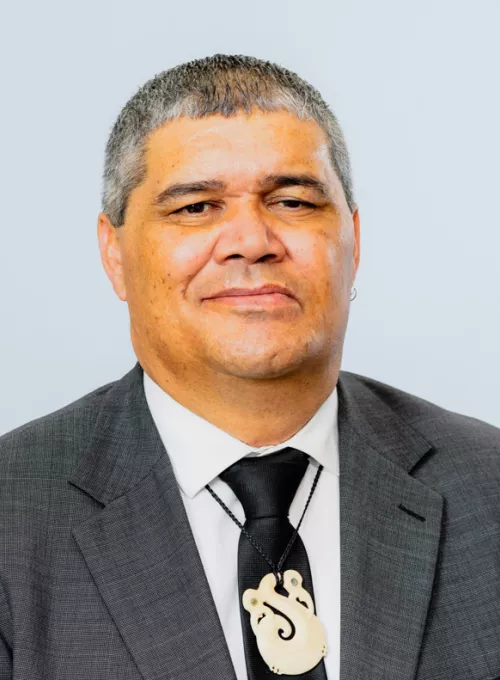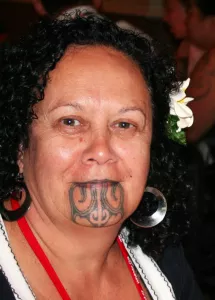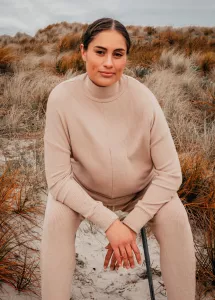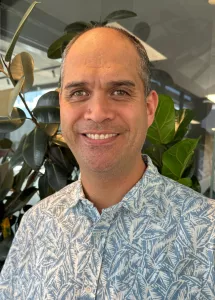
Ko Moumoukai te maunga
Ko Waitirohia pupu rere ana ki Ngānuhaka te awa
Ko Ngāti Rākaipaaka, ‘Ngā Whare Rau o Te Tahinga o Te Rā’,
Ko Ngāti Kahungunu, Ko Ngāti Rongomaiwahine ngā iwi
Ko te waka tapu o Takitimu, ko Kurahaupō ngā waka
Ko Ihaka Whaanga te tangata
Hui te mārama, hui te ora e!
John Whaanga is of Ngāti Rākaipaaka, Ngāti Kahungunu and Ngāti Rongomaiwahine descent. He is known for his work in Māori health, Māori education, and iwi development.
John grew up in Nuhaka in northern Hawkes Bay, near Te Māhia. He was raised in his grandfather’s house and was, in his own words, brought up “to be indulged” by his kaumātua, pakeke and village. They nurtured and developed his understanding of whakapapa, kōrero tīpuna and tikanga. They also instilled in him a deep sense of whanaungatanga, values, pride, and an understanding that service to one’s community and people was to be cherished and sought after.
John’s tribal service began at the age of 19 when he was instructed by his kaumātua to sit on the paepae. At the same time, he was asked to work for his iwi to advance their Te Tiriti o Waitangi claims. He did this for over 30 years, during which he held many roles. He was chair of Te Rūnanga o Ngāti Kahungunu ki te Ūpoko o te Ika, based in Wellington, he was chair of the executive committee of Te Iwi o Rakaipaaka Incorporated, and he was also a mandated representative to progress the Treaty of Waitangi claims lodged by Ngāti Rakaipaaka. As part of that role, he chaired Te Tira Whakaemi o Te Wairoa. In 2019, he resigned as chair to take up the position of lead negotiator for his iwi, having overall responsibility for negotiations with the Crown.
John successfully led negotiations to their conclusion in 2016, when Te Tira Whakaemi o Te Wairoa signed a $100 million Deed of Settlement with the Crown. He was acknowledged for this in Parliament in 2018. John’s career in government began in the Department of Conservation in 1989 (working on Treaty of Waitangi policy and negotiations) before moving on to the Ministry of Education (Māori Education Group) in 1991.
John originally joined the Ministry of Health in 1993 as a foundation member of the then newly established Māori Health Directorate, Te Kete Hauora. He then spent six years working in the Ministry, culminating in management roles in both public health and Māori health (as Manager, Te Kete Hauora). Following that, John worked for KPMG Consulting for two years and then for over 10 years, he ran his own management consulting company, Kaipuke Consultants Limited.
John then undertook a number of significant roles in tertiary education, including as Chief Advisor Wānanga for the Tertiary Education Commission, Deputy Chief Executive for Te Wānanga o Aotearoa, and Chief Operating Officer at Taratahi Institute of Agriculture.
John returned to Manatū Hauora in 2019 as the Deputy Director-General of Māori Health. In this role, he manages Te Pou Hauora Māori, the Māori Health Directorate. Te Pou Hauora Māori leads the Ministry’s response to Te Tiriti o Waitangi and Māori health equity. They work alongside Te Aka Whai Ora to monitor the health system (alongside Te Puni Kōkiri) and co-develop Māori health policy and strategy. Te Pou Hauora Māori also leads Māori engagement and manages Māori-Crown relationships on behalf of Manatū Hauora.
John has overseen a range of kaupapa during his time at Manatū Hauora. He started by rebuilding the Māori Health Directorate, following its re-establishment by Dr Ashley Bloomfield, nearly ten years after its disestablishment. Over the last four years, John has grown the capacity and capability of Te Pou Hauora Māori to lead its own strategic work areas and work across the Ministry and wider system.
As a centre of Māori health expertise, Te Pou Hauora Māori leads the Manatū Hauora Te Tiriti o Waitangi and Māori health equity response. It also partners with other directorates and leads training to create communities of practice for Te Tiriti o Waitangi, equity and anti-racism.
John also led the development of the Te Tiriti o Waitangi position statement for Manatū Hauora, particularly building off the Wai 2575 Hauora Report. This Tiriti framework is embedded in Whakamaua: Māori Health Action Plan 2020-2025.
John shepherded the development of this plan through to its launch in 2020. At the time of its release, Whakamaua was the first Māori health action plan in over a decade. As part of its implementation, John has oversight for a variety of initiatives, including Ao Mai te Rā: the Anti-Racism Kaupapa and Houhia: Equity by Design. Ao Mai te Rā became the basis of Manatū Hauora’s position statement on racism and anti-racism.
Both Ao Mai te Rā and Houhia provide the opportunity to build on the work of Māori pioneers and to set the pathway to a future system that is anti-racist, upholds Te Tiriti o Waitangi, and delivers equitable outcomes for Māori.
John was also instrumental in both the COVID-19 response for Māori and the health and disability reforms.
Links:



